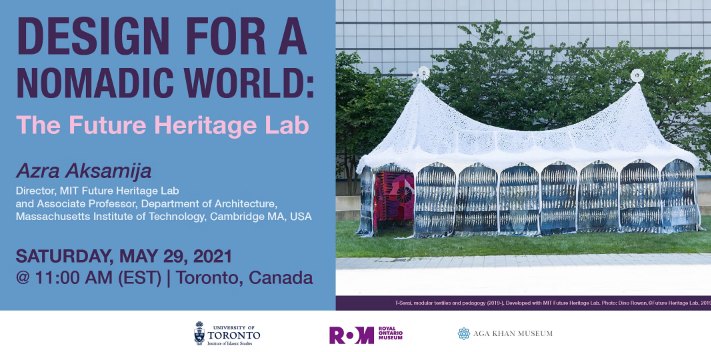Design for a Nomadic World: The Future Heritage Lab
Azra Aksamija explores how art, architecture, and design can address the needs of displaced people.

Design for a Nomadic World: The Future Heritage Lab
Azra Aksamija, Director of the MIT Future Heritage Lab and Associate Professor, Department of Architecture, Program in Art, Culture and Technology, Massachusetts Institute of Technology, Cambridge MA, USA
In this conversation, artist and designer Azra Aksamija explores how art, architecture, and design can address the emotional, cultural, educational, and aesthetic needs of displaced people while fostering cross-cultural understanding and social cohesion between migrants and host communities. The talk title references Victor Papanek’s seminal book Design for the Real World (1971), which revealed the discrepancy between design and the “real needs” of people, especially the unprivileged and marginalized. Azra Aksamija’s work and her MIT Future Heritage Lab takes on Papanek’s mission to broaden the dialogue around the role of art and design in conditions of conflict and crisis and enable social healing, innovation, and transcultural exchange. Azra will discuss a number of her projects as part of this illustrated conversation.
Azra Aksamija is Director of the MIT Future Heritage Lab and a designer and artist who practices in the public sphere. Her art asks how alienation could be turned into empowerment. She works with textiles, photography, design, animation, and writing. Rooted in the history and theory of art and architecture, her artistic practice and academic research explores how social life is affected by cultural bias and by deterioration and destruction of cultural infrastructures within the context of conflict, migration, and forced displacement. Building on the rich legacy of art concerned with the production of social relations under nationalism and capitalism, her work stands out for its subjects, its research-driven methodology, and the assertion of the art object as a mediator between social and aesthetic critiques. She seeks to enhance knowledge and raise critical awareness of the conditions, causes, and consequences of social alienation to both inform the field and impact society.
Since 2000, Azra has produced over 40 artistic projects and 112 exhibitions and has curated 14 shows. She has published many articles and two artist’s books including Mosque Manifesto: Propositions for Spaces of Coexistence (2015), a hybrid of a book and an art object, and Museum Solidarity Lobby (MSL) (2018). She is currently working on a monograph entitled 1002 Inventions: Art and Design in the Al Azraq Refugee Camp.
This conversation will be co-hosted by the series organizer, Dr Fahmida Suleman, Islamic World Curator, Royal Ontario Museum, and Dr Ruba Kana‘an, Assistant Professor of Islamic Art and Architecture, Department of Visual Studies, University of Toronto Mississauga.


Commissioned by the Aga Khan Museum Toronto, designed with MIT Future Heritage Lab
Exhibition photos: Toni Hafkenscheid ©Aga Khan Museum, 2020



Developed with MIT Future Heritage Lab
Photos: Dino Rowan, ©Future Heritage Lab, 2019

Commissioned by Manifesta 7, Rovereto, IT
Photo: ©Future Heritage Lab

A collaboration between Future Heritage Lab with residents of the Al Azraq Refugee Camp, Jordan
Photo: ©Azra Aksamija

Commissioned by the Festival New Hamburg, German Theater, Hamburg, DE
Photo: ©Azra Aksamija

Commissioned by the Architectural Forum Upper-Austria (afo), Linz, AT
Photo: ©Azra Aksamija

Commissioned by Stroom, The Hague, NL
Photo: ©Azra Aksamija

Commissioned by the ORTung/Cultural Department of Salzburg Government, AT
Photo: ©Azra Aksamija
About the Islamic Art and Material Culture Collaborative (IAMCC)
This event is part of an eight-part monthly series entitled “Crafting Conversations: Discourses on the Craft Heritage of the Islamic World – Past, Present and Future,” an initiative of the Islamic Art and Material Culture Collaborative (IAMCC), Toronto, Canada.
The IAMCC is a new research network based in Toronto that brings together the capacities and resources of the University of Toronto, the Royal Ontario Museum and the Aga Khan Museum. Its aim is to foster innovative and interdisciplinary research on the diverse arts and material cultures of the Islamic world in its broadest sense.
For more information on the series and the IAMCC, please visit: https://islamicstudies.artsci.utoronto.ca/research-labs/islamic-art-and-material-culture-collective-iamcc/. This event will be held via Zoom. If you have any questions or want to be added to the IAMCC mailing list please email: fsuleman@rom.on.ca